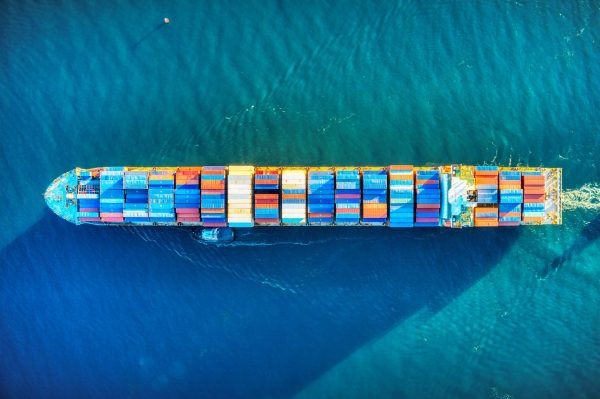Catholic Organizations Uncover Invisible Humanitarian Crisis (23 March 2021, Global)

Catholic Organizations Uncover Invisible Humanitarian Crisis
Catholic organizations are mobilizing to address an invisible humanitarian crisis affecting men and women who work at sea, while calling on U.S.-based giant retailer Walmart to do more for the wellbeing of seafarers.
Have you ever stopped to think how easily you can enjoy your favorite coffee from Brazil, use prescription medicine produced in Germany or fill your car with gasoline made with crude oil from Saudi Arabia?
The answer lies in the 90% of global trade moved by sea and in the many seafarers who work to move cargo to and from the 6,000 ports around the world. By continuing to transport the products and equipment needed for our survival during a global pandemic, seafarers join the ranks of essential workers who protect our wellbeing and safety around the world. As Pope Francis has stressed, “Without the people of the sea, many parts of the world would starve.”
The International Catholic Migration Commission (ICMC) is a member of the Coalition of Catholic Organizations Against Human Trafficking (CCOAHT) along with 29 other national and international Catholic agencies working to eliminate the scourge of human trafficking.
Each year during Lent, the CCOAHT launches a campaign to raise awareness of forced labor in the fishing industry. During this Lent and Spring, CCOAHT is urging Catholics and others to use their voices as community members and consumers to pay tribute to the life of the seafarer and uplift the safety and wellbeing of one of the world’s most invisible group of essential workers.
An Invisible Humanitarian Crisis
Seafaring is one of the most dangerous occupations in the world. Seafarers deal with turbulent seas made worse by climate change, modern-day piracy, long and grueling workdays, exposure to the elements and lack of medical attention while aboard a vessel. In normal times, ships enact a “crew change” policy. Every 4-10 months, one ship’s crew is changed for another in order to protect crew members from exhaustion and allow them to return to their families until their next contract.
As many governments prevent boats from docking at their ports in an effort to contain the spread of COVID-19, more than 400,000 seafarers have been left trapped on ships long after their original contract has expired. Many are experiencing severe trauma as well as mental and physical health issues.
The crew change crisis has also created risks of labor exploitation, since seafarers are being compelled to continue working at sea without a valid contract and beyond the 11-month at-sea limit mandated by international law. At the same time, newly contracted seafarers awaiting to board a vessel are stranded in hotels and dormitories without the means to provide for themselves or their families.
This “humanitarian crisis at sea” is a global concern and an important focus of CCOAHT’s March 2021 campaign. The campaign provides resources and information to help Catholics and other interested and committed people to support its two-fold call
- for governments and shipping companies to pay greater attention and put an end to the crew change crisis, and
- for seafarers to be designated as essential workers with priority access to vaccines.
The campaign also encourages supporters to engage in a key advocacy action: to join the more than 750 organizational signatories of the Neptune Declaration on Seafarer Wellbeing and Crew Change. The Declaration calls for the recognition of seafarers as essential workers and an end to the crew change crisis.
No Shipping, No Shopping
Another focus of CCOAHT’s campaign is to call on Walmart to use its position as one of the major retailers in the U.S. to acknowledge how the ongoing success of their business is reliant on seafarers. Specifically, CCOAHT invites Walmart to show concern for seafarers’ wellbeing by signing the Neptune Declaration.
The Declaration points to the important role industry stakeholders have to play in “addressing the crew change challenge and building a more resilient maritime logistics chain”. Walmart is the world’s largest retailer and operates in 24 countries. Its support for the Neptune Declaration would raise awareness of the crew change crisis across the global business sector and act as a catalyst for further support from industry actors.
As Walmart sources products from more than 100 countries, signing the Declaration would be a welcome acknowledgement of the contributions of seafarers to its business success. It would also help raise awareness among its customers on the origins and supply chains of their favorite products. As one of the campaign social media taglines states: “No Shipping, No Shopping.”
The March 2021 campaign is being carried out by the Coalition of Catholic Organizations Against Human Trafficking (CCOAHT) in partnership with the Catholic seafarers’ ministries Stella Maris and the Apostleship of the Sea of the United States of America (AOS-USA).
What You Can Do
You can take action now and during the whole of Lent and Spring to support the CCOAHT campaign:
- Use this online form (choose the option “Company Feedback and Questions”) to urge Walmart to acknowledge their reliance on seafarers for the healthy functioning of their business model, and to show concern for seafarers’ wellbeing by signing the Neptune Declaration.
- Download the backgrounder Solidarity With Seafarers as Key Essential Workers and use it to let others around you know about the “crew change” humanitarian crisis that affects more than 400,000 seafarers around the world.
- Use your social media accounts to express your support for the Neptune Declaration, a statement signed by hundreds of organizations around the world that lists specific action items to ensure that seafarer safety is prioritized. Download this image and use the hashtags: #CrewChangeCrisis #SeafarersAreKeyWorkers #NeptuneDeclaration #NoShippingNoShopping
This article was published in the news section at the website of ICMC:

